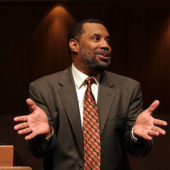Here is part two in a series that shares keys to reading the Bible effectively. Haven’t read part one?
Reading the Word of God is one of the most important spiritual disciplines that modern-day Christians have at their disposal to grow in their personal relationship with Jesus Christ. Unfortunately, this spiritual discipline is often under-utilized and under-appreciated. Many Christians have never read their Bibles consistently or have read it in the past, but now find themselves unable to keep up.
Here’s a few things to consider if you are embarking on your own journey through the Bible, or you’re just picking up where you left off years ago.
Expect God to reveal himself to you
God will not withhold the understanding of His Word from anyone who calls on His name and seeks Him through the Scriptures. We don’t have to wonder if God will reveal himself us, He will.
In Matthew 9:28-30 Jesus enters a house of blind men with the intention of giving them their sight and he asks them, “Do you believe that I am able to do this?” and they responded, “Yes, Lord.” Jesus proceeds to touch their eyes and says, “According to your faith be it done to you.”
Immediately their eyes were opened. The blind men’s lives were changed forever as a result of their faith. Like the blind men, our lives can also be changed from the inside out. If we apply the same faith that the blind men had to our Scripture reading, God will reward us and reveal Himself to us through His Word.
He wants us to meet with Him and read His Word. He eagerly waits to reveal Himself to us through His Word if we ask. All we have to do is open our Bibles and begin to read, asking Him to reveal Himself to us, and trusting the Holy Spirit inside us to cause us to begin to understand. God wants us to believe that He can and will reveal himself. As a result, if we diligently fill our lives with the Word of God, waiting patiently and expectantly, God will reveal himself. Let’s stop hoping God will show Himself to us and instead, let’s expect Him to as He promises that He will.
We don’t have to rush
Reading Scripture isn’t a race. We don’t have to rush.
Sometimes, we treat the Bible like a textbook we skim a day before a test hoping to glean enough knowledge in order to scrape by without failing. It is incredibly beneficial to take time to slowly and methodically read the Bible. If something doesn’t make sense, re-read it several times. If it still doesn’t make sense, consult the footnotes of a Study Bible, or search the Scriptures for other places the topic is addressed.
Let Scripture interpret Scripture. It is essential to understand that the amount of Scripture we take in will not always determine how much the Holy Spirit speaks to us. Reading two chapters instead of one won’t always give us twice the amount of insight and encouragement. Some of the most encouraging and enlightening instances of Bible reading come from concentrated meditation on just a few passages of Scripture.
Once again, we aren’t the source of comprehension, the Holy Spirit is. If the Holy Spirit isn’t active, nothing we read in the Scripture will be able to change our hearts.
Eliminate distractions
“But Jesus often withdrew to lonely places and prayed.” Luke 5:16
While we spend time reading the Word it is beneficial to give God our undivided attention. Consider turning off the TV, music, and find a secluded place where we can be in God’s presence free of distractions, like Jesus did. With the advent of cell phones, we don’t have to be alone even when we’re alone. We should consider leaving our cell phones in another room when we are entering our time with the Lord to study Scripture.
During His ministry on earth, Jesus modeled this very practice of eliminating distractions. If it was important for Jesus, who was one with the Father, to find solitude, how much more important is it for us? Giving God our undivided attention makes it easier to concentrate on the Word and listen for the Holy Spirit tugging at our heart. It also allows us to show God in a very tangible way that He really is all we need.
Check back next week for more keys to reading the Bible effectively.


















